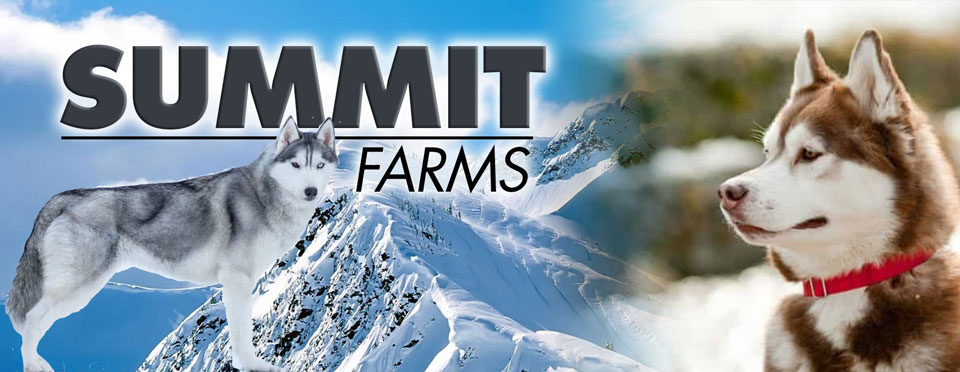Caring For Alaskan Dog Breeds (from: Prestige Animal Hospital)
We know that because you care so much about your dog, you want to take good care of her. That is why we have summarized the health concerns we will be discussing with you over the life of your Malamute. By knowing about health concerns specific to Alaskan Malamutes, we can tailor a preventive health plan to watch for and hopefully prevent some predictable risks.
Many diseases and health conditions are genetic, meaning they are related to your pet's breed. There is a general consensus among canine genetic researchers and veterinary practitioners that the conditions described herein have a significant rate of incidence and/or impact in this breed. That does not mean your dog will have these problems; it just means that she is more at risk than other dogs.
Taking Care of Your Alaskan Malamute at Home
Much of what you can do to keep your dog happy and healthy is common sense, just like it is for people. Watch her diet, make sure she gets plenty of exercise, regularly brush her teeth and coat, and call us or a pet emergency hospital when something seems unusual (see "What to Watch For" below). Be sure to adhere to the schedule of examinations and vaccinations that we recommend for her. This is when we'll give her the necessary "check-ups" and test for diseases and conditions that are common in Malamutes. Another very important step in caring for your pet is signing up for pet health insurance. There will certainly be medical tests and procedures she will need throughout her life and pet health insurance will help you cover those costs.
Routine Care, Diet, and Exercise
Build her routine care into your schedule to help your Mal live longer, stay healthier, and be happier during her lifetime. We cannot overemphasize the importance of a proper diet and exercise routine.
- Supervise your pet as you would a toddler. Keep doors closed, pick up after yourself, and block off rooms as necessary. This will keep her out of trouble and away from objects she shouldn't put in her mouth.
- Brush her coat as needed, at least weekly.
- Alaskan Malamutes often have serious problems with their teeth, so you'll need to brush them at least three times a week!
- Clean her ears weekly, even as a puppy. Don't worry-we'll show you how!
- She's a large dog with lots of energy, so keep her mind and body active, or she'll get bored. That's when the naughty stuff starts.
- Mals are expert diggers and climbers. It is recommended that you bury your fence and that it is at least 6 feet tall.
- Malamutes can be affected by snow nose, which is a loss of pigment from the nose, making her prone to sunburn. She will need dog-safe sunscreen.
- Keep your dog's diet consistent and don't give her people food.
- Feed a high-quality diet appropriate for her age.
- Exercise your dog regularly, but don't overdo it at first.
Alaskan Malamutes: What's Good About 'Em, What's Bad About 'Em (from: yourpurebredpuppy)
The rugged Alaskan Malamute is a working dog, best suited to people who love the great outdoors. He plays vigorously and is most content when pulling or packing a load (sledding, ski-joring, weight pulling, backpacking), especially in cold weather. This breed should not be kept in a hot climate.
Alaskan Malamutes are very challenging to train and live with. Without sufficient exercise and challenging things to do, Malamutes become rambunctious and bored, which they usually express by chronic howling and destructive chewing. Bored Alaskan Malamutes are famous for chewing through drywall, ripping the stuffing out of sofas, and turning your yard into a moonscape of giant craters.
Potential aggression toward other animals is a real concern. When this breed fights, the battles can be serious and bloody. The Alaskan Malamute can be so dominant toward other dogs of the same sex that two males or two females should not be kept together unless you are a very experienced owner.
Malamutes can be predatory with smaller pets. I would not keep a Malamute with a cat unless the pair has grown up together.
When outdoors, Malamutes must be securely confined behind a high fence, for they can be escape artists with strong exploratory instincts. Once loose, they won't come back when you call them and they may run deer and molest livestock.
On the other hand, Alaskan Malamutes are usually great with people. From their wolfish appearance, they may look like intimidating protectors, but most Mals are friendly with everyone and make miserable watchdogs.
Still, this is a substantial, powerful breed, so it is essential to socialize youngsters so they grow up to trust and respect people.
This self-reliant breed will test for position in the family pecking order. Unless you establish yourself as the alpha (number one), he can be headstrong and demanding. Unneutered males, especially, can be very dominant and possessive of their food.
